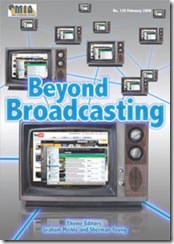Home » 2008 (Page 28)
Yearly Archives: 2008
Do Free Online Books Make Money?
Does making a book freely available online hurt or enhance the sales of the hardcopy? Advocates suggest that if you read a bit of the book online you’re more likely to buy the hardcopy if you like it and finish reading it on paper. You’re also more likely to recommend it to friends who might buy it, too. Those against think that free only equals more free, and no one is going to buy a book if you get given the whole thing at no cost. Neil Gaiman and his publisher have been experimenting with this question, and Gaiman’s American Gods has been available for free online for a month (it disappears again in a few days). So, it’s definitely interesting to see who many people read the book, and how hardcopy sales appear to have been effected. So: the initial stats from Neil Gaiman’s blog:
It’s worth drawing people’s attention to the fact that the free online reading copy of American Gods is now in its last six days online (it ends 31 March 08). I learned this from an email from Harper Collins, which also told me the latest batch of statistics.
For American Gods:
68,000 unique visitors to the book pages of American Gods
3,000,000 book pages viewed in aggregate
And that the weekly book sales of American Gods have apparently gone up by 300%, rather than tumbling into the abyss. (Which is — the rise, not the tumble — what I thought would happen. Or at least, what I devoutly hoped would happen.)
The book is up at This URL, if you’re interested, or want to pass it along to a friend.
While this example isn’t exactly necessarily a template for new authors – Gaiman’s existing reputation as an author and his well-read blog both come into play in looking at the figures (not to mention that American Gods is an excellent read) – the overall figures are definitely encouraging and hopefully we’ll see more experiments like this one in the future (and, yes, I realise this isn’t the first such experiment – hello Cory Doctorow – but it’s still a noteworthy one).
Beyond Broadcasting: ‘Watching Battlestar Galactica in Australia and the Tyranny of Digital Distance’
 I’m very pleased that the ‘Beyond Broadcasting’ issue of Media International Australia is out, not only because it features some excellent articles asking some great questions about the future of television in the era of digital communication, but also because it features an article of mine that I’ve been thinking about on and off for a number of years. My article, ‘Watching Battlestar Galactica in Australia and the Tyranny of Digital Distance‘ has ideas that will already be familiar to readers of this blog (and, indeed, my old blog Ponderance) as the concepts in this paper have slowly built up over time and appeared sporadically in blog form (such as here and here). When I started writing up these fragments into the final paper and posted the abstract in this blog, I was delighted that it provoked a conversation with some of my blog’s readers. A larger number of people seem to have found their way to that post after hitting NBC’s “We’re sorry, but the clip you selected isn’t available from your location” message and punching it into Google, and a few of them offered a comment on this post before heading elsewhere (quite possibly in search of a proxy so they can watch the US-hosted geo-blocked content).
I’m very pleased that the ‘Beyond Broadcasting’ issue of Media International Australia is out, not only because it features some excellent articles asking some great questions about the future of television in the era of digital communication, but also because it features an article of mine that I’ve been thinking about on and off for a number of years. My article, ‘Watching Battlestar Galactica in Australia and the Tyranny of Digital Distance‘ has ideas that will already be familiar to readers of this blog (and, indeed, my old blog Ponderance) as the concepts in this paper have slowly built up over time and appeared sporadically in blog form (such as here and here). When I started writing up these fragments into the final paper and posted the abstract in this blog, I was delighted that it provoked a conversation with some of my blog’s readers. A larger number of people seem to have found their way to that post after hitting NBC’s “We’re sorry, but the clip you selected isn’t available from your location” message and punching it into Google, and a few of them offered a comment on this post before heading elsewhere (quite possibly in search of a proxy so they can watch the US-hosted geo-blocked content).
While the article has taken a couple of years to evolve from the initial idea to this published version, the ideas still seem current. Indeed, there was an engaging debate recently in th US between the New York Times Vulture blog (and here, and here) and film and media scholar Michael Newman over the issue of newspapers and blogs posting spoilers about current TV shows when audiences are increasingly time-shifting and either watching their shows a few days later on TiVO, or a few months later on DVD. As I argue in my paper, the problem of avoiding spoilers becomes even harder for viewers in other countries, when the broadcast (or the option to download legally) is often delayed by a number of months – an issue indicative of what I’ve called the tyranny of digital distance.
I’m also pleased that the editors of this themed issue, and the general editor of Media International Australia were kind enough to give me permission to put up a post-print of my article here. (A post-print, for those interested, is the final version of the article submitted to the journal after the peer review process and final changes to the article have been made, but before the article is page-made and the layout done for the journal itself.) So, if you fancy reading the whole paper and you don’t have access to Media International Australia through your library, you can still read the full paper here.
If you can get hold of the journal, there are a number of other papers which are a great read. One of these, Axel Bruns’ ‘Reconfiguring Television for a Networked, Produsage Context’ can be accessed over at his blog.
As always, any comments or thoughts on my paper or the issues it touches on are most welcome!
links for 2008-03-24
-
And the YouTubers have voted. Good to see Felicia Day’s The Guild, Tay Zonday’s “Chocolate Rain” and the Harry Potter Puppet Pals all taking honours!
-
Jericho, revived but very well-oiled fan activity after first being cancelled at the end of season one, is now completely dead for CBS. Sadly, dedicated fans still need to bring in big numbers or shows just don’t make it.
-
A new alternative in the 2008 election race courtesy of Battlestar Galactica! [Via Jean]
-
Lawrence Lessig’s attempt to leverage online communities to reform the US Congress is under way. This attempt will be extremely instructive about the amount of power and influence that can come from a web-based movement.
-
An interesting look at the demographics of iTunes Movie downloaders and some speculative answers as to why Zoolander is at the top of the charts. [Via Chuck]
-
A visual history of pretty much ever gaming console system since 1970. Amazing how they’ve changed, but also how similar the design of a console system remains!
Hillary Clinton and the perils of stock footage
We’ve been talking about all sorts of things to do with media production these past few weeks in my Digital Media unit, including some conversations about stock footage. So, it’s rather timely to see that, as has been widely blogged elsewhere, one of Hillary Clinton’s campaign advertisements has turned back on her due to the use of purchased stock footage. This is the advertisement in question, about the Red Phone ringing at 3am:
However, it turns out that the little girl supposedly afraid in her bed has grown up since that footage was shot, and Casey Knowles is no fan of Hillary Clinton as she explains in this rebuttal on YouTube:
Casey Knowles’ point that she “reject the politics of fear” is powerful given the message the stock footage of her younger self was being used to convey. It’s one of the perils of using stock footage that the people in that footage may very well have a life and opinion of their own. There’s nothing more effective that that last line: “I’m Casey Knowles and I approve this message. And not the other one. Something worth remembering both in politics and when sourcing stock footage from archives. [Via Barry]
Make A Cylon?!?

First thought: if we’ve learnt anything at all from Battlestar Galactica, shouldn’t we know better than to make a Cylon? (Intelligent machines evolving and rising up against their human oppressors and so on…)
That said, when MAKE, DVICE and the SciFi Channel team up and recruit Cylon actors Tricia Helfer (Number Six) and Grace Park (Boomer) to judge a competition in which entrants must physically construct (not just photoshop) a Cylon, I’m intrigued to see what emerges! Let’s just hope the entries aren’t too realistic. Details here.
links for 2008-03-20
-
A 15 yo Brisbane schoolgirl is struggling to get a profile removed from the US ‘Dating Psychos’ website, and has been told by the site managers she’ll have to sign up and pay for the website before they’ll do anything!
-
“SCI FI Channel has given a green light for production to begin on Caprica, a two-hour backdoor pilot and Battlestar Galactica prequel from executive producers Ronald D. Moore and David Eick.” (Cool!)
-
Adobe is hammering the DRM (Digital Rights Management) tools into the new versions of the Adobe Media Player, making Flash a whole lot less friendly and flexible. 🙁
